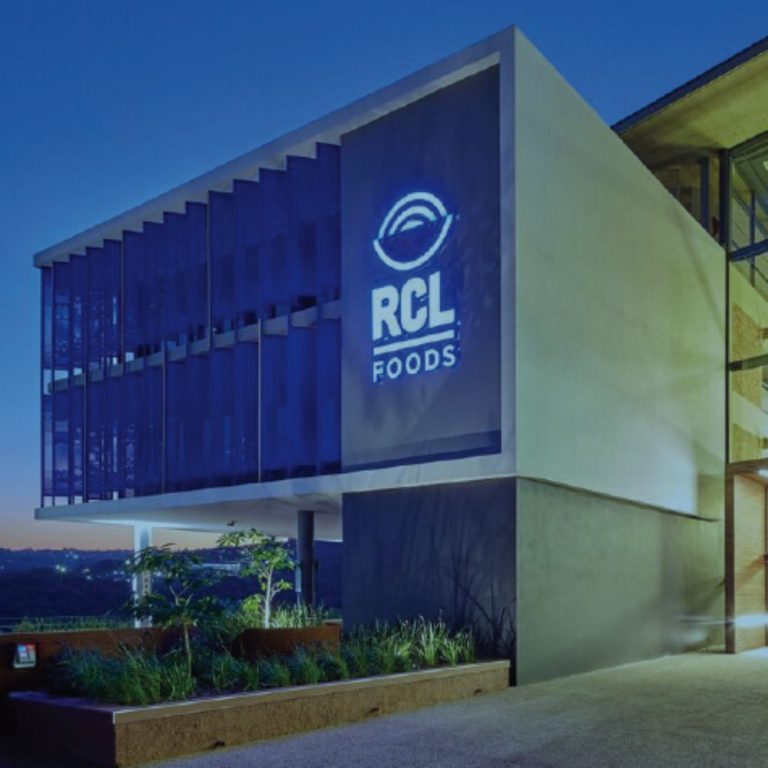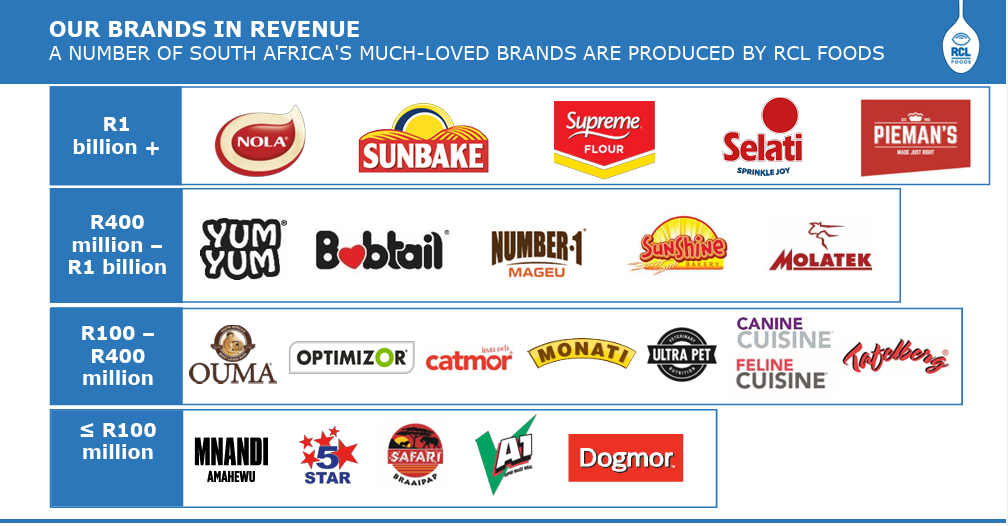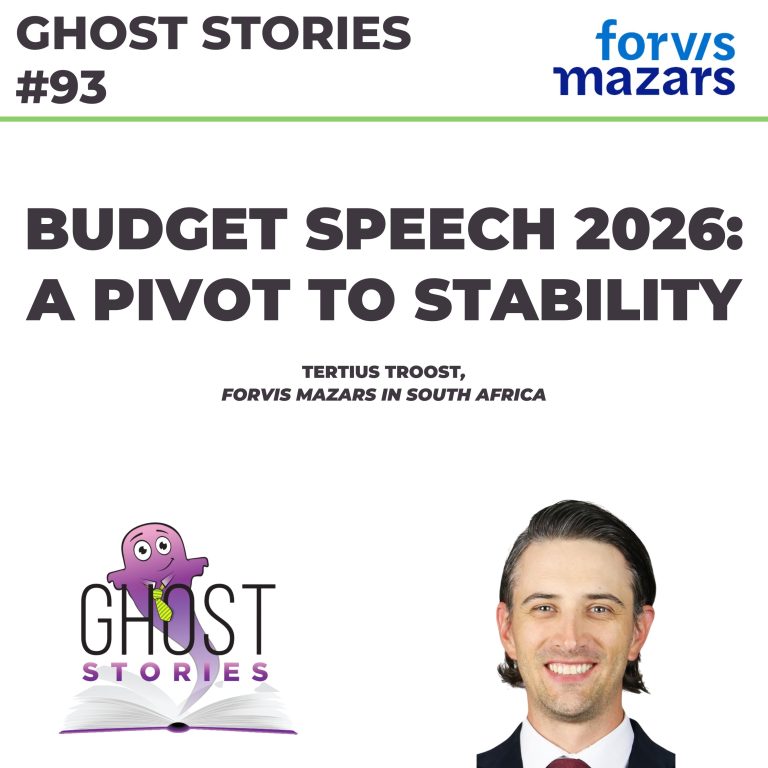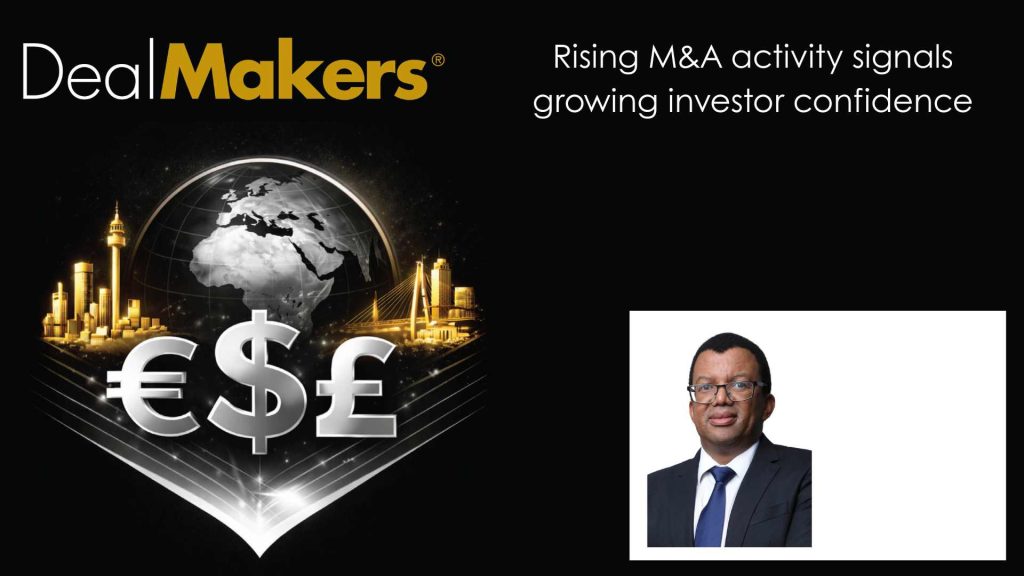FEATURED: RCL Foods navigates the bitter situation in sugar (JSE: RCL)
They are pushing hard in growth engines elsewhere
With revenue down 1.9% and EBITDA dropping by 24.6%, the six months to December 2025 were tough for RCL Foods. If you strip out once-offs and use the company’s view of “underlying EBITDA”, then you’ll find a decrease of 14.6%. Better, but still rough.
Similarly, HEPS is down 30.6% whereas underlying HEPS has fallen by 21.9%. Whichever way you cut it, that’s not a happy direction of travel.
The interim dividend has dropped by 25% to 15 cents per share.
Kudos to the company – while many corporates would prefer numbers like these to go away quietly, RCL Foods has been consistent in their support of the Ghost Mail platform. Just like they usually do, they’ve included a detailed view of their numbers in this piece that I recommend you check out for the full segmental performance.
The overall story here is that the Sugar segment is where you’ll find the biggest issues. Revenue fell 5.9% and EBITDA dropped sharply, down 48.5%. The EBITDA margin in that business is now just 6.8%, the lowest in the group. The stronger rand has made deep sea imports much cheaper, with current tariffs doing little to protect local industry.
Groceries grew revenue by 3.3%, although EBITDA decreased by 5% and margin fell from 13.7% to 12.6%. Pet food volumes were a highlight here, with more people choosing to get puppies and kittens instead of having babies. Such is the world we currently live in.
The Baking segment grew revenue by 0.4% and suffered a decrease in EBITDA of 4.2%, with margin dipping from 9.1% to 8.6%. Competition in the bread market was a major factor here, although a 3% increase in pie volumes suggests that we aren’t shy to throw calories at our problems.
But again, these EBITDA movements include some significant distortions in areas like fair value adjustments to raw material procurement positions, as well as insurance proceeds and partial recoveries of the sugar levy in the prior period.
If you use underlying EBITDA instead, then Sugar fell by 39.3% (still a nasty outcome), but Groceries increased by 8.7% and Baking was up 0.2%.
Management is doing what they can under the circumstances, but the sugar situation is a serious concern. This is why the share price is down 14% in the past year.
I’m curious about your view on tariffs. What do you think the right approach is?
Limited growth, but better trading margins and cash flows at Bidvest (JSE: BVT)
Sometimes you hit boundaries; other times you take quick singles
Bidvest is a very good company, but this doesn’t mean that they will shoot the lights out in every period. Growth in this world isn’t linear.
For the six months to December 2025, revenue was up 4% and trading profit increased by almost 7%. This means that trading margin improved by 31 basis points to 10.1%. Although HEPS was only up by 5.1% in the end (or 5.3% on a normalised basis), this is a decent result nonetheless.
Despite a significant increase in free cash flow, the interim dividend of 495 cents only represents growth of 5.3%. They’ve kept it in line with normalised HEPS, giving themselves flexibility around what to do with R3.8 billion in free cash for the period. The substantial increase in free cash was driven by a 36% uplift in net cash from operations, helped by lower net working capital investment.
Building the largest international hygiene business is the ambitious plan here, with hygiene services now contributing 55% of Services International’s trading profit. This may be a “boring” business by many standards, but it’s one that can generate dependable cash flow. I also don’t think that AI will be cleaning bathrooms anytime soon.
With little in the way of M&A activity planned for the second half of the year, Bidvest expects Return on Invested Capital (ROIC) to improve. It came in at 13.4% this period, 100 basis points lower than 14.4% in the comparable period. Capex investment will be concentrated in the Freight business.
The outlook is positive for South Africa and more subdued on the international front. With cash flow generation like this, Bidvest looks strong enough to weather most storms.
Clientèle signs off on an encouraging interim period (JSE: CLI)
The core metrics look good
The numbers at Clientèle are quite complex thanks to recent acquisitive activity that has seen the integration of 1Life and Emerald into the group. To add to the trickiness, IFRS 17 was adopted in the reporting period ended June 2025. This sets the scene for a set of financials for the six months to December 2025 that aren’t easy to interpret.
The consolidation of Emerald Life contributed R49.5 million to headline earnings in this period. The group number is R469.3 million and the restated base is R299.9 million, so just Emerald Life contributed growth of 16.5% to headline earnings. Group headline earnings increased by 56.5%, so the rest of the business is clearly doing well.
Clientèle achieved substantial growth in the total net insurance result thanks to a reduction in loss-making contracts in the current period. They also enjoyed a strong uptick in the total net investment result, with better returns on the recurring Premium Savings business and the shareholder portfolio, among other drivers of success. Perhaps the most impressive thing about Clientèle’s business is that there was only a very small increase in operating expenses in this period. This is despite the significant improvement in the earnings profile of the business.
In insurance, a key valuation metric is Embedded Value (EV). This increased from R9.2 billion to R10.3 billion. The annualised recurring return on EV jumped from 14.3% to 23.7%, yet the group is trading at a significant discount of 25% to the EV per share.
I wouldn’t be surprised to see an upward move in this share price.
Flat turnover just isn’t enough at Italtile (JSE: ITE)
Goodness knows they’ve warned you about this
Credit to the Italtile management team: they’ve tried very hard in recent years to warn the market about the tough conditions in the manufacturing side of the business. The share price is down 29% over 3 years, with the dividends along the way helping to mitigate the pain to a total return of -7.7%.
Although Cashbuild (JSE: CSB) doesn’t have a manufacturing arm like Italtile, both options have sucked over the past year in the market:

Ouch.
The latest numbers from Italtile don’t suggest much of an improvement to the trajectory. For the six months to December 2025, system-wide turnover was unchanged at R6.1 billion. Trading profit fell 14% to R1.0 billion. HEPS dropped by 14% to 60.6 cents. And the ordinary dividend followed suit, down 14%.
The simple reality is that if turnover goes sideways in an inflationary environment, profits will go the wrong way – unless a company has pricing power and can protect margins through price increases. And when it comes to South African consumer discretionary spending, pricing power is a myth.
As a silver lining, this flat turnover was achieved against a base period that included the non-recurring boost from two-pot withdrawals.
The stronger rand is actually making things worse for them, as it makes imports even more competitive. This makes South Africa a hotbed for the dumping of cheaper products from elsewhere in the world, damaging local manufacturing.
Although CTM suffered the worst of the oversupply issues (as is to be expected in the format that offers cheaper prices), Italtile Retail (more upmarket) grew volumes and market share, with the successful award of the Club Med project in KZN as a highlight. TopT is also struggling unfortunately, although they are opening four more stores despite the challenges.
In case you’re wondering about omnichannel retail in this space, the webstores could only manage gradually increasing traffic. With products like these, it feels like most people would still want to see and touch the product.
As a shareholder in Weaver Fintech (JSE: WVR), I was pleased to see Italtile’s comments that “buy now pay later” has become more popular in the retail space.
In the manufacturing side of the business, Ceramic Industries, capacity utilisation was only 77%. Cost reductions couldn’t offset the decline in profitability. To make it worse, protectionist trade policies in neighbouring countries made it harder for Ceramic Industries to export from South Africa, so they really are a sitting duck for cheap imports. They are obviously doing all they can to win new business, including a push into the construction market through brands like Ezee Tile.
Just when you thought Australia couldn’t possibly inflict further pain on South African businesses, Italtile found an “inconsistency” in Ceramic Australia’s monthly reporting. This led to a negative impact of A$7.6 million. Sigh.
I’m surprised to see references to unreliable energy transmission and distribution infrastructure, with a note on how this has damaged Italtile’s equipment. It just shows that there are troubles out there beyond just good ol’ fashioned load shedding. The company is also navigating the medium-term picture for natural gas supply, including getting pricing from Sasol (JSE: SOL).
With Lance Foxcroft stepping down as CEO with effect from 30 June 2026 due to “changed family circumstances” and taking over Ceramic Industries instead, Brandon Wood (the current Group COO) will step into the CEO role. It’s certainly not an easy job in this industry.
The outlook is cautiously optimistic, with management hoping that an uptick in GDP will give a boost to construction and home renovations.
Record financial results at JSE Limited (JSE: JSE)
This is your reminder that the owner of the exchange is listed on its own product!
The JSE has released results for the year ended December 2025. They were fantastic, with EBITDA up 15.5% and HEPS up 17.7%. Return on equity was a juicy 22%, up from 20.2% in the prior year.
Thanks to the cash generative nature of the business, the ordinary dividend is up by 16% to 961 cents per share and there’s even a special dividend of 100 cents per share for good measure.
Here’s an important point about the JSE that few people actually realise: non-trading income was 35% of operating income in this period. Although that’s actually lower than the 38% they achieved in the comparable period, this is because 2025 was an exceptional year of trading activity on our local market. The exchange has many income streams that are unrelated to the actual level of trade on the market.
Looking at the segments, it was mostly good news. Capital Markets grew revenue 18%, Post-Trade Services was up 18% and Information Services increased 10%. The downer was JIS revenue, which fell by 7% due to lower interest rates and a margin income adjustment in the prior year.
Operating expenses grew 8.3% year-on-year. If you strip out the increasing trading activity, the increase was 6.5%. This gives you insight into the fixed vs. variable cost base.
Leila Fourie is moving on from the CEO role, with Valdene Reddy taking the reins with effect from 1 April 2026. Reddy inherits a company with a 12-month share price performance of 41% – and that’s always a nice way to start.
The company separately announced that Ben Kruger will be stepping down as the lead independent director at the AGM in May.
Libstar’s potential acquirers have fizzled out (JSE: LBR)
This is exactly why it’s called “trading under cautionary”
Having previously spent several years of my career in corporate advisory capacities, I can tell you that many deals fall over during the negotiation process. This is why cautionary announcements should be taken literally – you need to exercise caution in these situations to avoid being burnt.
Here’s what the burn can look like: Libstar’s share price was trading around 9% lower in mid-afternoon trade after the company withdrew the cautionary announcement related to negotiations with potential suitors. Encouraged no doubt by the recent performance in the company, Libstar’s view is that the negotiations were undervaluing the shares in the company.
They don’t actually indicate the pricing of the potential offer, so we have no way of knowing how far apart the acquirers and the board actually were.
The bigger question is whether the meaningful gains in the share price will at least partially stick, as the company performance has been on the up. Time will tell.
Merafe kicks the can down the road at its smelters (JSE: MRF)
The game of cat-and-mouse with government and Eskom continues
As we saw in Merafe’s trading statement at the end of last week, recent trading at the company has been poor. This is because smelters have been switched off while Merafe tries to secure a sustainable electricity deal with Eskom.
We can spend all day debating whether or not it’s fair for a particular sector to get a favourable electricity tariff. In reality, the government will assess this based on the cost/benefit to the country. And if something isn’t done for Merafe’s electricity price, jobs are going to be lost.
With government and Eskom giving in-principle support to an electricity tariff of 62 cents per kWh, it seems like Merafe has a chance here. With some careful wording in the announcement around how the exact Ts & Cs of the tariff will make all the difference, Merafe has decided to extend the s189 consultation termination date from 28 February 2026 to 31 March 2026.
Or, put differently, they are making it clear to government that the job losses will still happen if the tariff doesn’t come through at the right levels.
A huge year for MTN (JSE: MTN)
MTN Nigeria and MTN Ghana have been fantastic for the group numbers
After MTN Nigeria released excellent numbers on Friday, it was MTN Ghana’s turn to impress the market on Monday. As the cherry on top, this triggered the release of a trading statement by MTN as the group company.
Let’s deal with the trading statement first before digging into the segmental performance. MTN has flagged that HEPS will increase from R1.10 per share (restated FY24 base) to between R12.64 and R12.84 per share. That’s an increase of more than 11x!
This certainly isn’t reflective of how things are going in South Africa, with MTN noting pressure in the prepaid business. They don’t specifically say it, but we know that Cell C (JSE: CCD) and especially Telkom (JSE: TKG) are giving the bigger players plenty to think about in that space.
This kind of earnings increase is only possible thanks to the volatility in the African subsidiaries. MTN Nigeria swung from losses into substantial profits thanks to a vastly different forex reality, while MTN Ghana achieved strong growth in profits.
Looking more closely at MTN Ghana as the new information in the market, we find that service revenue was up 36.2% and EBITDA increased by 43.5%. EBITDA margin expanded to 60.1%, an increase of 300 basis points. Although there was a 30.2% increase in depreciation based on the capex programme in that country, the EBITDA growth was enough to propel a 49.0% increase in profit before tax.
The investment in Ghana continues, with capex excluding leases up 46.7%. Capex intensity increased from 17.4% to 18.8%.
Unlike in Nigeria where voice revenue remains a strong growth driver, Ghana only reported growth of 7.8% in that type of revenue. Data revenue was up 48.8% and digital more than doubled year-on-year.
With stable inflation in Ghana of between 6% and 10%, these are impressive results. The market will now wait and see what the picture looks like in South Africa for MTN, with the huge recovery in Africa having driven positive share price moves.
A headline loss at Thungela, but for an unusual reason (JSE: TGA)
Accounting gymnastics aside, it’s still a negative update
Headline Earnings Per Share – the HEPS reference that you keep seeing in Ghost Bites – is usually a good indicator of maintainable earnings. The idea is that it removes many of the non-recurring items. But sometimes, we find ourselves in a situation where it still ends up being skewed.
The latest trading statement from Thungela is one such example. While a whopping R8.8 billion worth of impairments is excluded from HEPS, the inability to recognise deferred tax assets is not.
This has contributed to a most unfortunate situation where HEPS has swung into the red, with an expected loss of R5.50 to R7.50 per share. In the comparable period, it was a profit of R25.59 per share.
Much as the drop is due to non-cash items, suggesting that Thungela still generated positive cash flow, the reality is that these impairments reflect a tough outlook for coal. If you can’t recognise deferred tax assets, it’s because you have a dim view on having enough taxable income available to offset the tax credits.
To put some numbers to the state of play, the Richards Bay Benchmark coal price fell 15% and the Newcastle Benchmark coal price was down 22% year-on-year. The world is working hard to reduce reliance on fossil fuels. At some point, this has to start impacting demand, and thus prices.
The market will largely look through the impairments, as this is a typical example of a company where the near-term cash flow is what matters. The long-term value of Thungela isn’t the major component of the current valuation.
Nibbles:
- Director dealings:
- KAP (JSE: KAP) announced that a director of the holding company sold shares worth R3.3 million, in anticipation of his resignation from the board on 30 April 2026. Separately, the company announced that major subsidiary PG Bison has sold shares in KAP worth R270k.
- The CEO of Spear REIT (JSE: SEA) is out there buying shares for his family again, this time to the value of almost R100k.
- A director of Visual International (JSE: VIS) sold shares worth R35k. Separately, an associate of a different director sold shares worth R6.6k.
- Exxaro (JSE: EXX) has concluded the acquisition of manganese assets from Ntsimbintle Holdings and OMH Mauritius. This is a R10.6 billion deal that gives Exxaro control over the Tshipi Borwa Mine (the world’s 4th largest manganese mine), along with exposure to other assets. You may find this interesting: the Kalahari Manganese Field is home to around 80% of the world’s known manganese resources. Exxaro’s cash buffer of R12 – R15 billion is a thing of the past after this deal, with the company reviewing the capital allocation framework. The company has also noted that the Mokala Sale Transaction remains subject to fulfilment of conditions precedent by 27 February 2027.
- Here’s one for shareholders in both KAP (JSE: KAP) and Sasol (JSE: SOL). KAP’s subsidiary, Safripol, relies on Sasol for the supply of propylene and ethylene under evergreen supply agreements. But the parties have had disputes over pricing and volumes, with the matter currently in arbitration. KAP has delivered a bloody nose in the form of the arbitrator ruling in favour of Safripol (in terms of pricing). Sasol could technically apply to the High Court for a review of the award, but Safripol is applying plenty of pressure elsewhere through complaints to the Competition Commission and applications to the Competition Tribunal. The dispute around the volume commitment is still in arbitration as well.
- AfroCentric (JSE: ACT) released a trading statement for the year ended 31 December 2025. HEPS is expected to be between 13.5 cents and 14.25 cents, a huge increase vs. 3.80 cents in the prior period. Before you get too excited, there’s a change in the year-end in the prior period that affects the year-on-year comparability of numbers. There are also some significant impairments that are excluded from HEPS, but which indicate pressure in certain segments. On the plus side, the administration and managed care operations did well, as did the capitation lines of business (a specific type of healthcare payment model) in dental and managed care.
- Nampak (JSE: NPK) announced that Glenn Fullerton is resigning from his role as CFO. He will step down on 31 August 2026, giving the company time to find a suitable replacement. He’s certainly been there through thick and thin with the group, having been appointed back in 2015.
- Attbid has acquired additional shares in RMB Holdings (JSE: RMH) to take the total stake to 7% of the shares in issue. Based on this share purchase, the aggregate stake of all concert parties (including Atterbury Property Fund) is 39.90%.
- Transpaco (JSE: TPC) has decided to walk away from the acquisition of Premier Plastics after the Competition Commission prohibited the deal. There are appeal structures in place, but it’s a long and expensive road. They’ve opted to rather call it a day on this one.
- Kore Potash (JSE: KP2) announced that under its formal sale process, two parties have been evaluating a potential acquisition of the company. One party has decided to walk away “for internal reasons” – whatever those might be. This leaves one party remaining. The competitive tension has now left the room though, so one wonders how this might affect the price. In a separate announcement, the company confirmed that it has acquired a further 0.46% in the company that holds its potash projects. This take their stake up to 97.46%. The additional 0.46% is being acquired for $1 million in cash. Importantly, Kore Potash has been granted the right to acquire the remaining 2.54% if an offer comes through for the entire group, essentially a “come-along” right that you would see in a typical shareholders agreement. For added complexity, regardless of how an offer would or wouldn’t be structured, the Republic of Congo has the right to own 10% of the project as a free carry. Kore Potash is still waiting for the government to indicate which entity will hold the 10%.
- Here’s a notable board appointment for you: Prof Adrian Saville, a very well-known figure in the asset management and business strategy space, has joined the board of 4Sight Holdings (JSE: 4SI) as part of two new appointments to the board. The other appointment is Tshepo Shabangu, who brings plenty of experience to the board. 4Sight Holdings is a small cap that behaves a lot like a much bigger company. Usually, that’s a sign that the journey to becoming much more valuable will be a success!
















